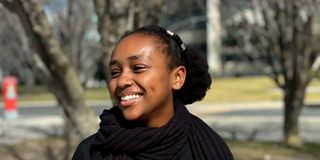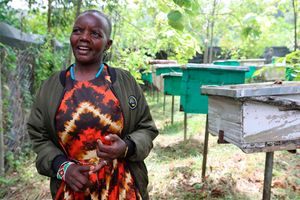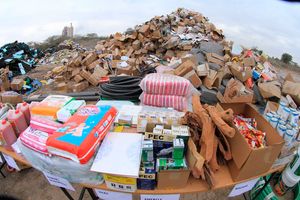
From the bustling streets of Nairobi to the sun-drenched suburbs of Australia, a growing number of Kenyans are carving out vibrant new lives in Australia.
Drawn by world-class education, career opportunities, and a refreshing lifestyle shift, they’re stepping boldly into uncharted territory and thriving.
But beyond student visas and sleek skylines are personal journeys filled with culture shocks, fierce resilience, late-night Premier League rituals, and the search for home in a land far from familiar.
Meet the faces of the migration, whose dreams stretch across continents, and success is redefined by daring enough to begin again.

From Molo to the world
At 38, Francis Mwaura leads a thriving life in Sydney, Australia. As the Chief Executive Officer of Open Maps Education Agency, he takes Kenyan students through their professional journey to further their education abroad.

His is a life of resilience, a visionary, and the strength that comes with education to change lives. Francis began his education in Kenyan local schools, Kambara Primary School and Njenga Karume Secondary School in Molo town.
After obtaining a B+ in his KCSE examinations, he was enrolled at Moi University, Kabianga campus.
But life had other plans. “I always had a dream to go abroad if an opportunity ever presented itself,” Francis recalls. That opportunity came when his father spoke about his dreams to a friend whose son was in Australia on scholarship.
Francis travelled to Australia in 2007 and enrolled in the Australian Catholic University to pursue a Bachelor of Business in Accounting, graduating in 2010.
Later, he joined the prestigious University of Sydney, ranked among the top 100 universities globally, for a Master’s in Commerce.
His academic experiences, both as a student and later as a professional in the education sector, have greatly influenced his work. “Education should lead to something,” he says. “It’s not just about the degree, but what it opens up for your life and career.”
As a fresh graduate, Francis faced the familiar struggle of many international students – entering the job market with little experience.
Having arrived in Australia at just 18, most of his early jobs were menial enough to pay rent and survive. But persistence paid off. He took internships, and eventually, someone took a chance on him.
A recruiter suggested he pivot from accounting to sales. That led him to a role at IQPC, a global events company, where he got his foot in the door.
He spent about one year there before moving to National Australia Bank, where he worked for two years.
A former manager then introduced him to international education, sparking a decade-long career that took him across three continents.
He spent two years working in Dubai, one year in Kenya, and then returned to Australia to work for eight years at the University of New England before starting Open Maps Education Agency, where he is now the CEO.
“At Open Maps, we empower students to make informed choices on whether or not to stay in Australia after their studies,” says Francis.
Comically, he was made a permanent resident within three months of graduating, thanks to a lack of accounting expertise at the time.
Francis currently lives in Sydney, a place he calls home but where he regularly compares less than favorably with Kenya's more family-oriented setup, returning once or twice a year.
Living in Australia, especially Sydney, is not cheap. “Rent here is paid weekly,” he explains. “You're looking at between Sh50,000 and Sh85,000 a week.” For students, shared accommodation in a two-bedroom apartment may cost between Sh41,000 and Sh58,000 weekly. For families, a three to four-bedroom house can range from Sh50,000 to Sh83,000 weekly. Yet, the high wages balance the scales. “Australia has one of the highest minimum wages globally at Sh2,181 per hour. That’s why the cost of living is high, but manageable.”
Francis has fully embraced Australia’s love for the outdoors. “I go camping. I run in the forest with a head torch at 4am. It’s safe here,” he says with a laugh. While it seemed odd at first, the outdoor lifestyle has become a source of peace and wellness for him.
Adjustment to the culture wasn't simple. Homesickness, especially when parents got sick or reached milestones, was hard. “You can't replace seeing your parents every other weekend with once-a-year visits,” he reflects. Adapting to Australian culture also took some time, understanding the etiquette of communication and social communication. But Francis believes adapting is necessary. “If you don't know the local people, you'll be in trouble.”
Francis credits his discipline and work ethic for much of his achievement. “You look different, you sound different. Sometimes you're not the first choice. But if you're excellent at what you do, people notice. Skill has no race.”
His adopted homeland of Sydney is one of the world's most livable cities, and Francis is firmly settled both in business and community.
“My perception of Kenya has changed. I initially thought I could remain here indefinitely, but now I keep thinking about going back.”
One of his fondest experiences is when he went on a bungee jump over the Zambezi River in Zambia. Francis has stretched himself wide across more than 40 countries, but it's not his whereabouts, but his purpose that keeps him stable.

Wristbands, weather and weekly budgets
When Hellen Njoki departed Nairobi for Sydney in February 2024, she carried with her more than her bag. She carried with her the morals, memories and identity of the Kenyan heritage. She is at the University of Sydney studying a double degree in Law and Arts (Politics and International Relations) in New South Wales. Hellen also works part time.
To maintain a hold on her Kenyan roots, Hellen believes in regular family conversations. “I chat with my family at least once a day. Sometimes I phone my mum, my sister or dad. We also have a family group call when we can. That interaction is very important to me.”
She wears her Kenyan wristband with pride. “At home, it was just another accessory. But here, it’s a big part of my identity. When I meet another Kenyan wearing the band, it’s like an unspoken bond,” she says with joy.
Hellen lives in a university residential college, and that has enabled her to socialise with students from different cultures. From them, she has been in a position to exchange Kenyan culture. “Many haven't visited Africa. They only know stereotypes. Telling people the real stories of my motherland keeps me connected to my culture and teaches others as well,” she stated.
Adapting to life in Australia has had its surprises. “One of the biggest culture shocks for me was the way people respect rules,” Hellen recalls. “If there is no car in Kenya, you cross the road. Here, people wait even when there is no traffic. That was huge.”.
The cold weather was another shock. “Coming from Nairobi, I wasn’t used to winters as low as four degrees,” she said.
Hellen began her visa process in October 2023 and sped it up by using an alternative medical examination route. “I got my visa three days before my flight. Others who applied at the same time were delayed, some even gave up,” she said.
While in high school, Hellen was under the IGCSE (International General Certificate of Secondary Education) system. “The study system here is more student-oriented. They mind your well-being. I even got assignment delays when I was having a difficult emotional phase,” she said.
Hellen has two part-time jobs, one in support work and another as a judge for school debates. “I began working one month after arriving here,” she tells Lifestyle.
Although her exposure to working in Kenya helped her get a job, Hellen noted that Australian employers also value local certification. “They identified with my volunteer work in Kenya, but had to ensure that I'd completed courses locally too,” she said.
Community membership is also a part of her life abroad. She's a member of her university African Students Union and has also joined an organisation known as Kenyans in New South Wales.
Despite the distance, Hellen never loses touch with her family. She traveled to Kenya in December and stayed there for two months. “It was so good to be home. I realised how much I missed it,” she states.
Food is one thing she greatly misses. “I dream about chapati and even foods I didn't previously like, such as matoke,” she laughed. Catered college dorms limit her to accessing Kenyan food, but she visits friends' houses to prepare communal food.
Australia’s outdoor lifestyle is something Hellen has grown to love. “Everyone’s outside, walking, running, just enjoying nature. It’s not like Nairobi where life moves so fast,” she said. “Here, I’ve learned to take things slow and appreciate the little moments.”
Financially, Hellen practices tight budgeting. “I divide my money into spending money and savings money. That way, I am in charge of how much I spend. I strive to spend between Sh8,392.66 to Sh16,785.31 a week.”
She hopes to return to Kenya someday. “I want to make my career here first, but I hope to go back. There's nothing like home.”

Living Kenyan in Australia
Lecter Anyango Ouma, 32, lives in Perth, Western Australia. She moved to Australia in November 2022 and currently works for the Government of Western Australia Department of Communities as a contract officer. It was not just a professional transition for her from Kenya to Australia, but a start to a new life.
“I started my visa process in May 2022 and had it by October. It was challenging, so many documents, medical checks, and back-and-forth emails. At one point, I almost gave up because of how overwhelming it felt, but I stayed focused, and luckily, it came through early. I’m glad I pushed through.”
Lecter arrived on a student visa and enrolled at Kaplan Business School to pursue a Master's in Business Administration (MBA). She has a Bachelor of Commerce in Accounting degree from Egerton University and was also a CPA (Certified Public Accountant) finalist, achieving full membership with ICPAK (Institute of Certified Public Accountants of Kenya) in 2021.
She first had plans to migrate through a permanent residency pathway, but the English proficiency for accountants was high. “They required an eight-band score of IELTS (International English Language Testing system). I tried twice and didn't pass. So I came as a student. I just wanted to get my foot in the door,” she says.
After graduating with an MBA in May 2023, she was granted a post-graduate visa upon application. Under this visa, she is allowed to work full-time in Australia.
Adjusting to life in Australia came with its own challenges. One of the biggest shocks for her was the relaxed dress code. “It was surprising to see school children and even adults walk around half-dressed. Some people even walk barefoot in the streets,” she says, laughing.
Professionally, she found that even though her qualifications were accepted, once she had passed a competency test, getting employment was not always guaranteed. “Even with approved papers, they still want people with Australian experience. They only employ you if they can't source a local candidate,” she says.
Despite this, Lecter appreciates the learning culture in Australian workplaces. “They give you time to learn. They’re ready to train you,” she says.
Life in Perth is cheap, especially when it comes to housing. “As a student, it's expensive to rent a whole house on your own, so we sublet. I have a room for rent. Prices differ depending on the suburb, some from Sh41,000 to Sh67,000 per week,” she says.
She firmly holds on to cultural identity. “We have general and tribe-specific Kenyan groups where we socialise and meet. I still eat the same food – ugali, omena, and fish because of African shops in all the suburbs,” she says.
Staying connected back home is also important to her. She speaks to her daughter and family in Kenya every day. “I support my parents and siblings. Even though I’m here, Kenya is still home. I’m building back there. I plan to retire in Kenya,” she says.
Lecter also keeps up with Kenyan news and politics through social media platforms like Facebook, Tiktok, Instagram, and X (formerly Twitter).
One of her most memorable experiences since moving to Australia was a trip to Bali, Indonesia. “We went for my housemate’s birthday, and she got proposed to. It was such a beautiful surprise and a moment I’ll never forget,” she recalls fondly.
While she acknowledges there’s racism in Australia, she says it’s often silent. “In my first job, people asked how I got there as an African. Some didn’t talk to me just because I was Black. But I’ve learned to manage,” she says.
Her message for other Kenyans is one of encouragement. “Australia is a beautiful country with opportunities. But you must work hard and stay disciplined. If you get the chance, take it. We’re here to guide and support each other.”

Midnight EPL and quiet streets
When Victor Omollo boarded a plane to Australia just a month ago, he wasn’t just visiting; he was stepping into a new life. At 34, the software engineer made a bold move from Nairobi to Perth to reunite with his wife and build a future together. “The biggest motivation was family,” Victor says. “It’s not easy living apart, especially when you're still a young couple.”
Victor came to Australia on a spouse visa. “It was very easy. It took about one month,” he tells Lifestyle. “They put a lot of priority on family here, and the fact that we have a child contributed to making it happen smoothly.”
Victor had been building a successful career in Kenya. Having graduated with an IT degree from the Technical University of Kenya in 2016, he started working as an intern and part-time lecturer at KCA University. “I taught discrete mathematics prior to joining the corporate world,” he explains. He then worked for different large companies like Safaricom, SportPesa, and M-Pesa. His roles ranged from business analyst and product manager. Briefly working in South Sudan was an experiment of a sort, but he was not able to adapt. “The way of life and weather shock were too much. I had to return home,” he states.
Now in Perth, Victor hopes to find work in the same field. “Anything related to software engineering, product owner, business analyst, I’m open,” he says.
One of his biggest shocks was the still streets. “In Perth, you can walk a whole kilometer and not see anyone. It's like a ghost town at times,” Victor laughs. “In Nairobi, the streets are always alive.”
Cultural differences were also apparent to him. “Here, people are reserved. In Kenya, greeting strangers is the norm. Not so much here. I'm learning to mind my own business. I used to say hello to everyone, but now I just walk by.”
Still, he holds tight to his Kenyan identity. “I still eat ugali, wear clothes with the Kenyan flag, and stay up late to watch EPL matches,” says the Chelsea fan.
His most memorable experience so far was visiting Busselton City, a scenic spot about 300 kilometres from Perth. “There’s so much to see, the point where the Pacific and Indian Oceans meet, the jewel caves, the kangaroos, and the wineries. You can taste different wines for free!”
Although he’s settling into life in Australia, Kenya is still home. “I plan to visit every six months,” he says. “I’m planning to run for MP in Muhoroni town in 2032. Don’t be afraid to explore. If you get the chance, just show up and do it.”








